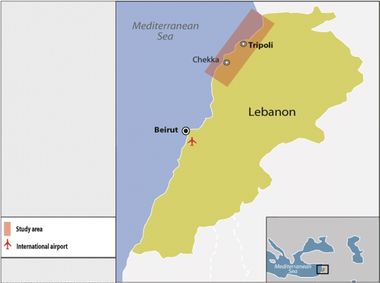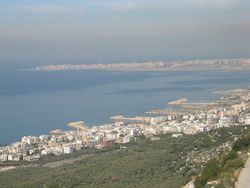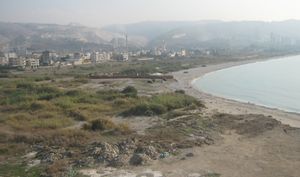Difference between revisions of "North Lebanon Coastal Zone"
(New page: North Lebanon Coastal zone (Lebanon): A coastline of about 102,5 km characterized by coastal issues related to urban sprawl, lack of management of solid waste and wastewater. It includes ...) |
Dronkers J (talk | contribs) |
||
| (25 intermediate revisions by 3 users not shown) | |||
| Line 1: | Line 1: | ||
| − | + | [[Image: North_lebanon_map.jpg|380px|thumb|text-top|left]] | |
| − | + | ||
| − | + | <u>'''CASE description'''</u> | |
| − | + | ||
| − | + | The Northern coastline constitutes approximately 37% of the total Lebanese coast with 102.5 Km of shoreline length. It includes three bays and two main headlands and a variety of river deltas as well as the Palm Island Nature Reserve. The coast is sandy/pebbly (51% of the total Northern coast) and rocky (49% of the total Northern coast). | |
| + | |||
| + | |||
| + | <u>'''ICZM phase'''</u> | ||
| + | |||
| + | [[ICZM_Process_diagram/Designing the Future|Designing the Future]] | ||
| + | |||
| + | |||
| + | <u>'''Main coastal issues'''</u> | ||
| + | |||
| + | * Erosion | ||
| + | * Urban sprawl | ||
| + | * Impacts on fisheries | ||
| + | |||
| + | |||
| + | <u>'''Relation between the coastal issues and the ICZM protocol principles and articles'''</u> | ||
| + | |||
| + | {| border="1" cellspacing="0" width="600px" style="margin: 1em auto 1em auto;" | ||
| + | |||
| + | |- valign="top" | ||
| + | | Coastal issue</br> | ||
| + | ---- | ||
| + | [http://www.pap-thecoastcentre.org/razno/PROTOCOL%20ENG%20IN%20FINAL%20FORMAT.pdf ICZM Protocol Principle: Article 6] | ||
| + | ! Erosion | ||
| + | ! Urban sprawl | ||
| + | ! Impacts on Fisheries | ||
| + | ! Socio economic | ||
| + | ! Legislation | ||
| + | |||
| + | |- | ||
| + | |(a) | ||
| + | |X | ||
| + | | | ||
| + | |X | ||
| + | |X | ||
| + | | | ||
| + | |||
| + | |- | ||
| + | |(b) | ||
| + | |X | ||
| + | |X | ||
| + | |X | ||
| + | |X | ||
| + | |X | ||
| + | |||
| + | |- | ||
| + | |(c) | ||
| + | |X | ||
| + | |X | ||
| + | |X | ||
| + | |X | ||
| + | |X | ||
| + | |||
| + | |- | ||
| + | |(d) | ||
| + | | | ||
| + | | | ||
| + | | | ||
| + | | | ||
| + | |X | ||
| + | |||
| + | |- | ||
| + | |(e) | ||
| + | | | ||
| + | | | ||
| + | | | ||
| + | |X | ||
| + | |X | ||
| + | |||
| + | |- | ||
| + | |(f) | ||
| + | |X | ||
| + | |X | ||
| + | |X | ||
| + | |X | ||
| + | |X | ||
| + | |||
| + | |- | ||
| + | |(g) | ||
| + | | | ||
| + | |X | ||
| + | |X | ||
| + | |X | ||
| + | |X | ||
| + | |||
| + | |- | ||
| + | |(h) | ||
| + | | | ||
| + | |X | ||
| + | |X | ||
| + | |X | ||
| + | |X | ||
| + | |||
| + | |- | ||
| + | |(i) | ||
| + | |X | ||
| + | |X | ||
| + | |X | ||
| + | | | ||
| + | | | ||
| + | |||
| + | |- | ||
| + | |(j) | ||
| + | |X | ||
| + | |X | ||
| + | |X | ||
| + | | | ||
| + | |X | ||
| + | |} | ||
| + | |||
| + | |||
| + | [[Image:North_lebanon1.jpg|250px|thumb|right|Marine Resources and Coastal Zone Management Program - Institute of the Environment - University of Balamand]] | ||
| + | <u>'''Relevance of the coastal issues'''</u> | ||
| + | |||
| + | The below are outcomes from studies carried-out within the context of the IMAC project: | ||
| + | (Please visit the download section on [http://www.balamand.edu.lb/imac the website of this project] for more details) | ||
| + | |||
| + | *Socio-economic assessment of the coastal zone: | ||
| + | |||
| + | # Municipal assessment focusing on budget of municipalities lead to a main conclusion which is the lack of financial and human resources for environmental issues. | ||
| + | # Socio-economic assessment of residents (education, gender, income) and their perception of the coastal zone. | ||
| + | # Assessment of partial GDP and main economic activities. | ||
| + | |||
| + | *Legal assessment: | ||
| + | |||
| + | Main recommendation is to establish an entity in charge of the coastal zone either through the existing governmental structure or the creation of a new one.</br> | ||
| + | No indicators were calculated from the toolbox yet, but some indicators have already been selected and linked to the IMAC strategy. The main challenge for the calculation of the indicators is securing the appropriate financial and material resources. | ||
| + | |||
| + | |||
| + | <u>'''Objectives'''</u> | ||
| + | |||
| + | - To mitigate coastal risk | ||
| + | |||
| + | - To improve urban sprawl and fishery resources management | ||
| + | |||
| + | |||
| + | <br style="clear:both;"/> | ||
| + | |||
| + | [[image: North_lebanon2.jpg|300px|thumb|left|Marine Resources and Coastal Zone Management Program - Institute of the Environment - University of Balamand]] | ||
| + | |||
| + | <u>'''End Products'''</u> | ||
| + | |||
| + | Reports on conservation and particular relevant coastal issues (coastal dynamics and pollution, urban sprawl and artificialiation, erosion, accretion and sea filling) | ||
| + | |||
| + | |||
| + | <u>'''PEGASO tools developed and used'''</u> | ||
| + | |||
| + | Indicators - Scenarios | ||
| + | |||
| + | |||
| + | <u>'''Other tools to be applied'''</u> | ||
| + | |||
| + | Economic assessment | ||
| + | |||
| + | |||
| + | <u>'''CASE Responsibles'''</u> | ||
| + | |||
| + | Manale Abou Dagher, Manal R. Nader, University of Balamnd, manal.aboudagher@balamand.edu.lb, Manal.nader@balamand.edu.lb | ||
| + | |||
| + | |||
| + | <span style="color: Blue"><small>Elaboration: Stefano Soriani, Fabrizia Buono, Monica Camuffo, Marco Tonino, University Ca’ Foscari of Venice.</small></span> | ||
| + | [[Category:PEGASO study sites]] | ||
| + | [[Category:Mediterranean Sea]] | ||
| + | [[Category:Coastal urban development]] | ||
| + | [[Category:Practice, projects and case studies in coastal management]] | ||
Latest revision as of 11:51, 6 August 2019
CASE description
The Northern coastline constitutes approximately 37% of the total Lebanese coast with 102.5 Km of shoreline length. It includes three bays and two main headlands and a variety of river deltas as well as the Palm Island Nature Reserve. The coast is sandy/pebbly (51% of the total Northern coast) and rocky (49% of the total Northern coast).
ICZM phase
Main coastal issues
- Erosion
- Urban sprawl
- Impacts on fisheries
Relation between the coastal issues and the ICZM protocol principles and articles
| Coastal issue
|
Erosion | Urban sprawl | Impacts on Fisheries | Socio economic | Legislation |
|---|---|---|---|---|---|
| (a) | X | X | X | ||
| (b) | X | X | X | X | X |
| (c) | X | X | X | X | X |
| (d) | X | ||||
| (e) | X | X | |||
| (f) | X | X | X | X | X |
| (g) | X | X | X | X | |
| (h) | X | X | X | X | |
| (i) | X | X | X | ||
| (j) | X | X | X | X |
Relevance of the coastal issues
The below are outcomes from studies carried-out within the context of the IMAC project: (Please visit the download section on the website of this project for more details)
- Socio-economic assessment of the coastal zone:
- Municipal assessment focusing on budget of municipalities lead to a main conclusion which is the lack of financial and human resources for environmental issues.
- Socio-economic assessment of residents (education, gender, income) and their perception of the coastal zone.
- Assessment of partial GDP and main economic activities.
- Legal assessment:
Main recommendation is to establish an entity in charge of the coastal zone either through the existing governmental structure or the creation of a new one. No indicators were calculated from the toolbox yet, but some indicators have already been selected and linked to the IMAC strategy. The main challenge for the calculation of the indicators is securing the appropriate financial and material resources.
Objectives
- To mitigate coastal risk
- To improve urban sprawl and fishery resources management
End Products
Reports on conservation and particular relevant coastal issues (coastal dynamics and pollution, urban sprawl and artificialiation, erosion, accretion and sea filling)
PEGASO tools developed and used
Indicators - Scenarios
Other tools to be applied
Economic assessment
CASE Responsibles
Manale Abou Dagher, Manal R. Nader, University of Balamnd, manal.aboudagher@balamand.edu.lb, Manal.nader@balamand.edu.lb
Elaboration: Stefano Soriani, Fabrizia Buono, Monica Camuffo, Marco Tonino, University Ca’ Foscari of Venice.


